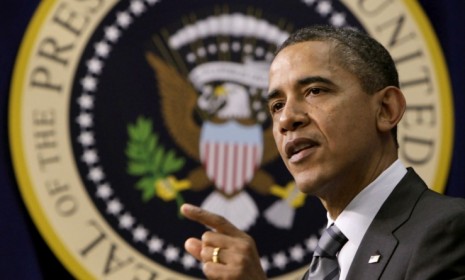Obama's 'stunning' Keystone XL oil pipeline delay: 4 takeaways
The plan to pump tar-sands crude from Canada to the U.S. was considered a done deal — then Obama punted until after the 2012 election

A free daily email with the biggest news stories of the day – and the best features from TheWeek.com
You are now subscribed
Your newsletter sign-up was successful
The State Department announced Thursday that it will postpone until 2013 a politically divisive decision on the controversial 1,700-mile Keystone XL oil pipeline that would move tar-sands crude from Canada to Gulf Coast refineries, saying the U.S. needs more time to study alternative routes. A possible ulterior motive: President Obama can now avoid saying whether he'll allow construction of the $7 billion pipeline until after the 2012 election. What does the "stunning victory" for the project's environmentalist opponents mean? Here, four key takeaways:
1. Obama is worried about angering the base
Obama was in "treacherous waters," says Ben Geman at The Hill. No matter which way he ruled on this "potentially explosive" matter, he was bound to upset some part of his base. Business groups and unions would have been livid if Obama spiked the project — expected to create thousands of desperately needed jobs. But green activists were threatening to cool on Obama's reelection campaign should he approve the pipeline.
The Week
Escape your echo chamber. Get the facts behind the news, plus analysis from multiple perspectives.

Sign up for The Week's Free Newsletters
From our morning news briefing to a weekly Good News Newsletter, get the best of The Week delivered directly to your inbox.
From our morning news briefing to a weekly Good News Newsletter, get the best of The Week delivered directly to your inbox.
2. Environmentalists might actually win
Everyone assumed "a presidential permit for Keystone XL was inevitable," say Dan Berman and Darren Goode at Politico. But environmentalists forced Obama to reconsider by insisting the pipeline would harm sensitive ecosystems, and that oil-sands crude produces more greenhouse gases than conventional oil. Let's not get ahead of ourselves, says Joan McCarter at Daily Kos. For now, this is just a "limited victory" for environmentalists.��Obama can still green-light the project once he no longer has to worry about liberals' support in 2012.
3. Canada might not wait for us
By the time Obama gets around to making a decision, the project might be dead, Canadian Finance Minister Jim Flaherty tells Bloomberg Businessweek. Don't be surprised if Canada looks for another way to ship out what would have been a secure source of oil for the U.S. Perhaps Canada will even explore exporting "our oil to Asia through British Columbia."
A free daily email with the biggest news stories of the day – and the best features from TheWeek.com
4. Some unions are going to be very upset
"Industrial unions were big supporters of the project and they're not likely to be thrilled," says Sean Higgins at Investor's Business Daily. This decision could cost the country as many as 20,000 jobs, "many of them high-paying." As Laborers International Union of North America President Terry O'Sullivan put it recently, with 9 percent unemployment, "this isn't a pipeline; it's a lifeline." We need those jobs, says Allahpundit at Hot Air, but Obama "put his re-election first."
-
 Should the EU and UK join Trump’s board of peace?
Should the EU and UK join Trump’s board of peace?Today's Big Question After rushing to praise the initiative European leaders are now alarmed
-
 Antonia Romeo and Whitehall’s women problem
Antonia Romeo and Whitehall’s women problemThe Explainer Before her appointment as cabinet secretary, commentators said hostile briefings and vetting concerns were evidence of ‘sexist, misogynistic culture’ in No. 10
-
 Local elections 2026: where are they and who is expected to win?
Local elections 2026: where are they and who is expected to win?The Explainer Labour is braced for heavy losses and U-turn on postponing some council elections hasn’t helped the party’s prospects